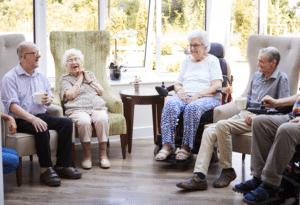
Transitioning your aging loved one from in-home care to a nursing facility can be an emotionally-draining process—one many loved ones tend to put off. Avoid unnecessary chaos and grief by understanding the signs of mental and physical decline and discussing your loved one’s care before injury or outburst. Suppose you notice that your elderly loved ones have a track record of skipping meals regularly, forgetting medication, taking constant spills, or showing signs of mental confusion and delirium. In that case, it may be time to hand the torch over to nursing facility specialists.
From the outside looking in, aging-in-place may seem like the preferred, more comfortable option for struggling seniors. However, you may find assisted living facilities’ benefits too good to ignore as you investigate further. Accessible senior living centers can offer your loved one a safe and comfortable residence equipped with hands-on help for day-to-day strains, personalized rehabilitation programs, and a diverse community to soothe feelings of isolation.
Ensure a seamless and guilt-free transition by adequately preparing your loved one for this new stage of life.
What to pack
Just like high school seniors sorting through unnecessary belongings in preparation for dorm life, senior citizens moving into assisted living facilities should also assess which beloved knickknacks can feasibly fit in their new space. Everyday basics like personal hygiene products, prescribed medications, a cell phone for seniors—enabling external communication—and a flashy outfit or two are a must. Along with the necessities, plan to move personal items, like family photos, meaningful heirlooms, a well-loved quilt, or—if the facility permits—a lounge chair for optimal comfort and respite.
Build a foundation
Seniors transitioning from at-home care to a nursing facility may experience emotional discomfort as they distance themselves from friends and family. Avoid this potential hurdle by visiting often and filling in nursing staff on your loved one’s quirks, personal favorites, and other important background information. Sprinkle in details—like a favorite snack or fun nickname—to help facility caretakers understand your loved one’s personality. That way, nursing home staff can provide your loved one with a home away from home.
Give them a say
Although your caring concern is appreciated and integral in the transition to assisted living facilities, ensuring your loved one maintains as much autonomy as possible is crucial. If they’re of sound mind, allow them to make everyday decisions. After all, it’s their health on the table.
If you have to maintain control for their own safety, inform your elderly loved ones of the gravity of the situation when making life-altering decisions. Along those same lines, ensure you maintain consistent communication. Keeping your loved one in the loop minimizes transitional shock and grants these seniors a sense of control.
Encourage community participation
Encouraging your loved one to participate in local senior life is an excellent route to acclimation. Nursing home staff often organize events and provide opportunities for community engagement and connection.
If your elderly loved one is wary of attending, tag along to relieve feelings of discomfort. Support your senior’s socialization efforts as they learn new hobbies, eliminate feelings of isolation, and create lasting friendship bonds.
Make it their home
Designing a customized safe space conducive to relaxation is imperative to your elderly loved one’s emotional well-being. Depending upon individual medical conditions, rooms may be equipped with equipment and machines, giving the space a hospital-like feel.
For those unfamiliar with nursing home living, these medical-equipment-filled spaces can be jarring, especially in contrast to previous family homes. Spruce up their living spaces with personalized decor, souvenirs, and family photos for a more personal feel.
Conclusion
Sending your loved one to a nursing home is not an easy decision to make. However, the specialized care these facilities offer may be just the thing to increase their quality of life. Take the time to research assisted living facilities specializing in home-like caretaking to ensure the senior citizens in your immediate network can live their remaining years to the fullest.